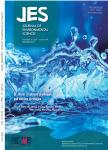Impact of fertilization on chestnut growth, N and P concentrations in runoff water on degraded slope land in South China
Impact of fertilization on chestnut growth, N and P concentrations in runoff water on degraded slope land in South China作者机构:College of Forestry South China Agricultural University Guangzhou 510642 China College of Natural Resources and Environment South China Agricultural University Guangzhou 510642 China
出 版 物:《Journal of Environmental Sciences》 (环境科学学报(英文版))
年 卷 期:2007年第19卷第7期
页 面:827-833页
核心收录:
学科分类:09[农学] 0902[农学-园艺学] 090201[农学-果树学]
基 金:Project supported by the Science and Technology Department of Guang-dong Province (No: 2004B33301007) the Rockefeller Brothers Fund
主 题:chestnut fertilization N concentration P concentration runoff water South China
摘 要:Growing fruit trees on the slopes of rolling hills in South China was causing serious environmental problems because of heavy application of chemical fertilizers and soil erosion. Suitable sources of fertilizers and proper rates of applications were of key importance to both crop yields and environmental protection. In this article, the impact of four fertilizers, i.e., inorganic compound fertilizer, organic compound fertilizer, pig manure compost, and peanut cake (peanut oil pressing residue), on chestnut (Castanea mollissima Blume) growth on a slope in South China, and on the total N and total P concentrations in runoff waters have been investigated during two years of study, with an orthogonal experimental design. Results show that the organic compound fertilizer and peanut cake promote the heights of young chestnut trees compared to the control. In addition, peanut cake increases single-fruit weights and organic compound fertilizer raises single-seed weights. All the fertilizers increased the concentrations of total N and total P in runoff waters, except for organic compound fertilizer, in the first year experiment. The observed mean concentrations of total N varied from 1.6 mg/L to 3.2 mg/L and P from 0.12 mg/L to 0.22 mg/L, which were increased with the amount of fertilizer applications, with no pattern of direct proportion. On the basis of these experiment results, organic compound fertilizer at 2 kg/tree and peanut cake at 1 kg/tree are recommended to maximize chestnut growth and minimize water pollution.



